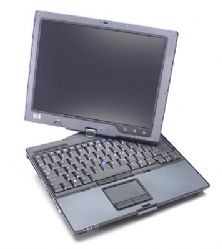Lisa Huettel, Associate Professor of the Practice, Electrical and Computer Engineering
 Dr. Lisa Huettel organized a Center for Instructional Technology faculty fellowship to facilitate and share faculty experimentation with using tablet PCs in teaching. She had been awarded a Technology in Teaching Grant from HP, which provided several carts of tablet PCs to be used for faculty teaching.
Dr. Lisa Huettel organized a Center for Instructional Technology faculty fellowship to facilitate and share faculty experimentation with using tablet PCs in teaching. She had been awarded a Technology in Teaching Grant from HP, which provided several carts of tablet PCs to be used for faculty teaching.
Participants in the Tablet PC faculty fellowship are listed below; their names link to descriptions of their work in the fellowship and how it impacted their teaching.
- Linda Franzoni, Professor of the Practice, Mechanical Engineering and Materials Science
- Jeff Forbes, Assistant Professor of Practice, Computer Science
- Bob Malkin, Professor of the Practice, Biomedical Engineering
- Joe Nadeau, Associate Professor of the Practice, Civil and Environmental Engineering
- Gary Ybarra, Professor of the Practice, Electrical and Computer Engineering
- Kathy Nightingale, Assistant Professor, Biomedical Engineering
 Dr. Huettel used the tablet PCs in two courses: Fundamentals of Electrical and Computer Engineering (ECE 27), and Introduction to Signals and Systems (ECE 54). In both courses, she prepared conceptual and/or computational problems for students to solve (sometimes individually, sometimes in groups). Students used tablet PCs to submit their work using either Classroom Presenter or Ubiquitous Presenter. Dr. Huettel then selected one or more student submissions as the basis of class discussion. She also used polls occasionally to survey student understanding/intuition.
Dr. Huettel used the tablet PCs in two courses: Fundamentals of Electrical and Computer Engineering (ECE 27), and Introduction to Signals and Systems (ECE 54). In both courses, she prepared conceptual and/or computational problems for students to solve (sometimes individually, sometimes in groups). Students used tablet PCs to submit their work using either Classroom Presenter or Ubiquitous Presenter. Dr. Huettel then selected one or more student submissions as the basis of class discussion. She also used polls occasionally to survey student understanding/intuition.
She says “I am most excited about the way students were more engaged when I used the Tablet for interactive activities. More students asked more questions when they had to try a problem in class and realized they didn’t exactly understand what they were doing.”
Students benefited, as she explained “Students report (on the survey, for example) that the interactive activities cause them to pay more attention and understand the material better (presumably because they are applying a new concept immediately, rather than waiting for a few days to attempt the homework).”
Using tablet PCs for interactive activities in the classroom impacted her teaching:
Since I feel the interactive activities are one of the most beneficial (and novel) uses of the Tablets, I spent a lot of time developing suitable questions to ask the students during class. This forced me to think carefully about all my examples so that common mistakes would be evident and so that I could make the conceptual points I felt were important. It was challenging and useful to try to anticipate the mistakes students would make. Using interactive activities has also forced me to be more flexible in my teaching style (since I did not always predict the actual outcome of an activity).
Participating in the fellowship had benefits: “one of the greatest benefits of this project has been the development of a community of faculty/CIT/OIT interested not just in Tablets, but in innovative teaching methods.”
This project produced several conference presentations:
- Lisa G. Huettel, Jeff Forbes, Linda Franzoni, Robert Malkin, Joseph Nadeau, and Gary Ybarra (2007) “Using Tablet PCs To Enhance Engineering and Computer Science Education” Workshop on the Impact of Pen-Based Technology on Education (WIPTE) abstract
- Lisa G. Huettel, Jeff Forbes, Linda Franzoni, Robert Malkin, Joseph Nadeau, Kathy Nightingale, and Gary A. Ybarra (2007) “Transcending the Traditional: Using Tablet PCs to Enhance Engineering and Computer Science Instruction” Frontiers in Education pdf
- Lisa G. Huettel (2008) “Introducing Tablet PCs to the Classroom: Course-Specific Impact in Engineering and Computer Science” HP Technology for Teaching Worldwide Higher Education Conference abstract and video

